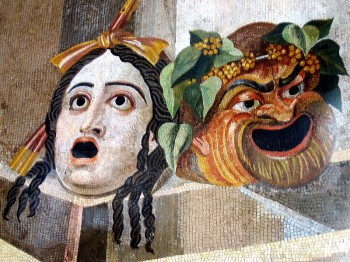Search results for "sofi oksanen/feed/www.booksfromfinland.fi/2012/04/tuomas-kyro-mielensapahoittaja-ja-ruskea-kastike-taking-offence-brown-sauce"
The Finlandia Prize for Fiction 2012
13 December 2012 | In the news
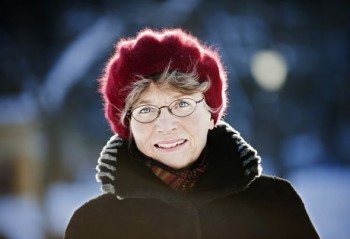
Ulla-Lena Lundberg. Photo: Cata Portin
The winner of the 29th Finlandia Prize for Fiction 2012, worth €30,000, is Ulla-Lena Lundberg for her novel Is (‘Ice’, Schildts & Söderströms), Finnish translation Jää (Teos & Schildts & Söderströms). The prize was awarded on 4 December.
The winning novel – set in a young priest’s family in the Åland archipelago – was selected by Tarja Halonen, President of Finland between 2000 and 2012, from a shortlist of six.
In her award speech she said that she had read Lundberg’s novel as ‘purely fictive’, and that it was only later that she had heard that it was based on the history of the writer’s own family; ‘I fell in love with the book as a book. Lundberg’s language is in some inexplicable way ageless. The book depicts the islanders’ lives in the years of post-war austerity. Pastor Petter Kummel is, I believe, almost the symbol of the age of the new peace, an optimist who believes in goodness, but who needs others to put his visions into practice, above all his wife Mona.’
Author and ethnologist Ulla-Lena Lundberg (born 1947) has since 1962 written novels, short stories, radio plays and non-fiction books: here you will find extracts from her Jägarens leende. Resor in hällkonstens rymd (‘Smile of the hunter. Travels in the space of rock art’, Söderströms, 2010). Among her novels is a trilogy (1989–1995) set in her native Åland islands, which lie midway between Finland and Sweden. Her books have been translated into five languages.
Appointed by the Finnish Book Foundation, the prize jury (researcher Janna Kantola, teacher of Finnish Riitta Kulmanen and film producer Lasse Saarinen) shortlisted the following novels: Maihinnousu (‘The landing’, Like) by Riikka Ala-Harja, Popula (Otava) by Pirjo Hassinen, Dora, Dora (Otava) by Heidi Köngäs, Nälkävuosi (‘The year of hunger’, Siltala) by Aki Ollikainen and Mr. Smith (WSOY) by Juha Seppälä.
New from the archives
13 February 2015 | This 'n' that
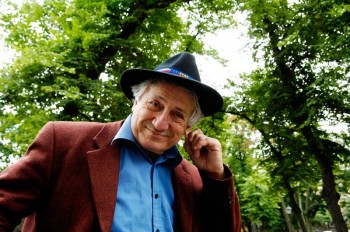
Daniel Katz. Photo: Veikko Somerpuro/WSOY.
In the midst of today’s richly cosmopolitan literary scene – we’re thinking of blockbusters like Sofi Oksanen’s Puhdistus (Purge, 2008), or Patjim Statovci’s Kissani Jugoslavia (‘My cat Yugoslavia’, 2014) (linkit) – it’s hard to imagine the colour and excitement represented by the work of Daniel Katz (born 1938) from the publication of his first book, Kun isoisä Suomeen hiihti (‘When grandfather skied to Finland’, 1969) onward. Characterised by dark humour, gentle irony, a wild imagination and a profound world view, Katz’s writing is informed but never defined by his outsider status as a Jew writing in Finnish.
Today’s story, taken from Katz’s book Talo Sleesiassa (‘A house in Silesia’) describes the journey taken by Erwin, a German Jew, to visit the home he lived in before the Second World War. Katz has a fine grasp of the ironies of history:
‘We arrived at the city of his birth, which currently is referred to as The City, for the sake of simplicity and tact: the town has – used to have, rather – two names, a German and a Polish, and one or the other party might take offence. My brother-in-law had in fact been born in a city whose name began with a B, though now it began with a W. Evolution of this kind is called phonetic history.’
The extract is accompanied by an interview of Daniel Katz by Daniel Katz.
*
The digitisation of Books from Finland continues apace, with a total of 356 articles and book extracts made available online so far. Each week, we bring a newly digitised text to your attention.
Arska
30 September 1982 | Archives online, Fiction, Prose
A short story from Kaksin (‘Two together’). Introduction by Pekka Tarkka
A landlady is a landlady, and cannot be expected – particularly if she is a widow and by now a rather battered one – to possess an inexhaustible supply of human kindness. Thus when Irja’s landlady went to the little room behind the kitchen at nine o’clock on a warm September morning, and found her tenant still asleep under a mound of bedclothes, she uttered a groan of exasperation.
“What you do here this hour of day?” she asked, in a despairing tone. “You don’t going to work?”
Irja heaved and clawed at the blankets until at last her head emerged from under them.
“No,” she replied, after the landlady had repeated the question.
“You gone and left your job again?”
“Yep.” More…
Drama news
20 May 2010 | In the news
A new internet service aims to provide information about Finnish drama and its writers.
Finnishplays.com is operated by the Finnish Dramatists’ Union, which has entered into partnerships with international drama agents in order to promote Finnish plays.
This year, Finnish plays that are to be performed abroad include Sofi Oksanen’s Purge (Puhdistus; Oksanen’s multi-prize-winning novel (you’ll find a sample from the English translation, by Lola Rogers, through the link) began life as a play at the Finnish National Theatre, appearing in print a year later), Reko Lundán’s Unnecessary people (Tarpeettomia ihmisiä), to be performed in Estonia and in Hong Kong, and Sirkku Peltola’s The Finnhorse (Suomenhevonen), in Iceland.
The website also features a catalogue of plays in translation, plus a search service for Finnish plays in various languages.
Finnish theatre doesn’t travel easily, never has – it’s a long way from here down to European theatre festivals, for example, taking place mostly in the south. But Finnish drama has began to travel more than ever, as new translations of plays into various languages have been made – and they, in turn, have made their way into theatres, in Europe and in the United States.
Song without words
30 June 2003 | Archives online, Fiction, Prose
Extracts from the novel Näiden seinien sisällä me emme näy (‘Within these walls we are invisible’, Tammi, 2003). Introduction by Maria Säntti
During the night the child was with Ellen, in her dreams. Ellen was turning over a pack of cards, the king rose, she followed the course of events from outside as it proceeded without her. The child was resting, settled, repeating her profile. The world was beautiful and all of them together in the face of death. Time stood still. A nocturnal bird sang through the rain. Ellen awoke, at night time does not stop; she thought, stepping from one memory to another. Everything was unfinished. It was a watchful night before words.
In the morning time rushed forward. Brain chemistry, Ellen thought as she lay in bed, mere brain chemistry. Then the train of thought broke off, a bright light suddenly snapped on as Tapani pressed the bedroom switch to search the wardrobe for a clean shirt. Ellen got up quickly, during the night the child had grown into something of which she knew nothing. She began to make porridge, and watched as the child opened like a plant toward the light. More…
Slowly does it
5 November 2009 | Reviews
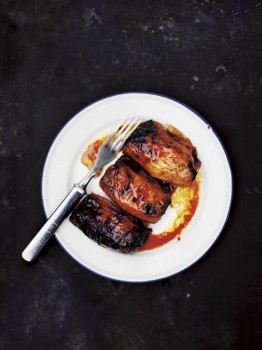
Straight from the oven: cabbage rolls. – Photo: Sami Repo
Mummola
[Grandma’s house]
(food: Hans Välimäki, photographs: Sami Repo, text: Mikko Takala, graphic design: Timo Numminen)
Helsinki: Otava, 2009. 224 p., ill.
ISBN 978-951-1-23930-7
€ 40
How paradoxical: in the past couple of decades, numerous internationally famous gourmet restaurants have sprung up in Finland, and at the same time it’s harder than ever to find ordinary, well-prepared ingredients for cooking at home.
It’s hard to get used to the fact that foods like beef and lamb kidneys, sweetbread, and cheaper cuts for use in stews and soups have made way for cheap Brazilian steaks on special offer, even at the largest stores’ meat counters. There’s no point in looking for whole chickens (and certainly not organic poultry), let alone whole, locally caught fish. The last time I asked at the fish counter of my local market if they might have any salmon heads and bones for chowder, the seller looked for a moment like she might summon security. The consumer wasn’t consulted when ‘taste’ and ‘variety’ were replaced by ‘ease’ and ‘speed’. More…
Human Freedom
30 June 1986 | Archives online, Fiction, Prose
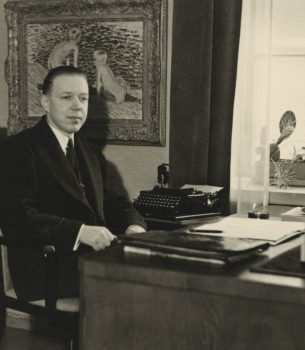
Mika Waltari. Photo: SKS Archives
Extract from lhmisen vapaus (‘Human Freedom’, 1950)
‘Where are we?’ Yvonne asked. ‘This isn’t the right street either. Somewhere between Alma and Georges V, they said. But there’s no sign of an aquarium.’
‘Talking of aquariums’, I suggested, ‘there’s a dog shop near here where they wash dogs in the back room. If you like, I’ll take you to see how they wash a dog. It’s a very soothing experience.’
‘You’re crazy’, said Yvonne.
My feelings were hurt. ‘I may sleep badly’, I admitted, ‘but I love you. I walk up and down the embankments all night. My heart aches, my brain is on fire. Then comes blissful intoxication, and for a little while I can be happy. And all you can do is to keep nagging, Gertrude.’
She wrinkled her brow, but I went on impatiently, ‘Look, Rose dear, just at present I have the whole world throbbing in my temples and in my finger-tips. Age-old poems are bubbling up within me. I am grieving for lost youth. I am boggling at the future. For just this one moment it is given to me to see life with the living eyes of a real human being. Why won’t you let me be happy?’
‘I have walked two hundred kilometres’, said a low, timid voice at my elbow. I stopped. Yvonne had stuck her arm through mine. She, too, stopped. We both looked down and saw a little man. He doffed a ragged cap and bowed. Flushed scars glowed through a grey stubble of beard. He was wearing a much-patched battle-dress from which the badges had long since disappeared. His face was wrinkled, but the little eyes were animated and sorrowful. More…
The Hunter King
9 August 2012 | Fiction, Prose
A story from the collection of fiction and non-fiction, Salattuja voimia (‘Hidden powers’, Teos, 2012)
And just as Gran Paradiso is the highest peak in unified Italy, the only mountain whose rugged, perpetually snow-capped summit reaches a height of over thirteen thousand feet (there are rumours that, on a clear day, you can see the peaks of both Mont Blanc and the Matterhorn from the top), so we know that the largest and most splendid mountain creature throughout Europe is the ibex, which grazes on the slopes of Gran Paradiso – the ibex, the alpine goat, the distant ancestor and modern-day cousin of our own homely goat, the French bouquetin and the German Steinbock.
The male ibex can be the size of a foal, about three feet tall, and its curved horns, like Oriental daggers decorated with rippling patterns, can grow to reach the same length as the creature’s own height. Local folklore tells us that, in the olden days when the mists of the distant Ice Age still hung heavy in the gullies of Valle d’Aosta and Valle d’Orso, herds of ibexes could still be seen further down the mountain slopes, but because the ibex loves the cooling mountain winds and values the cold, which keeps predators from the valleys at bay, they moved up to the most inhospitable terrain and made it their home.
But there was one beast that followed the ibex up these paths, sowing fear and causing death and destruction – and that beast was man. More…
November favourites: what Finland read
19 December 2013 | In the news

Best-selling: ‘Singing songbook’, edited by Soili Perkiö
The November list of best-selling fiction and non-fiction, compiled by the Finnish Booksellers’ Association (lists in Finnish only) features thrillers, new Finnish fiction and biographies.
Number one of the Finnish fiction list was the latest thriller by Ilkka Remes, Omertan liitto (‘The Omerta union’, WSOY). It was followed by the latest novels by Tuomas Kyrö, Kunkku (‘The king’, Siltala), and Kari Hotakainen, Luonnon laki (‘The law of nature’).
The translated fiction list consisted of best-selling crime writers: Dan Brown, Liza Marklund, Jo Nesbø. The Nobel Prize-winning author Alice Munro was number seven – and one of her books was at the top of the paperback fiction list.
Singing has inspired book-buyers so much that Soiva laulukirja (‘Singing songbook’, Tammi), edited by Soili Perkiö, was number one on the list of the books for children and young people: the push of a button delivers piano accompaniment to any of 50 Finnish songs – a clever idea. Perhaps it is popular with parents as entertainment for their kids on long car journeys?
The non-fiction list featured biographies of Jorma Ollila of Nokia fame, the banking tycoon Björn Wahlroos, Lauri Törni aka Larry Thorn who fought in three armies – those of Finland, Nazi Germany, and the US (he died in Vietnam in 1965) – an ice-hockey boss, Juhani Tamminen, and the sprinter Usain Bolt.
Government prize for translation 2012
14 September 2012 | In the news
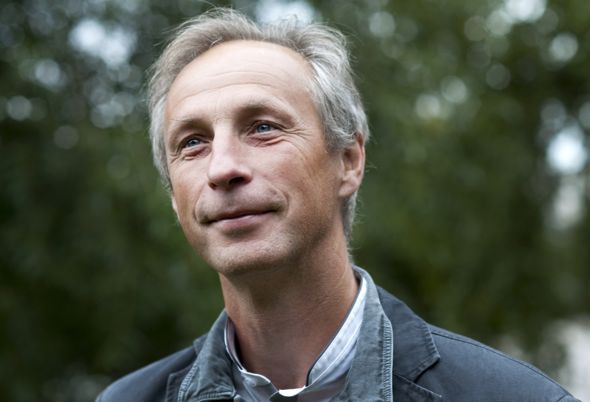
Vladimír Piskoř. Photo: Charlotta Boucht
The Finnish Government Prize for the Translation of Finnish Literature of 2012 – worth €15,000 – was awarded to the Czech translator Vladimír Piskoř.
Piskoř (born 1960), graduated from the Charles University of Prague in 1984, majoring in Finnish. Since the early 1990s he has translated almost 30 titles, most by contemporary authors, including Kristina Carlson, Kari Hotakainen, Leena Krohn, Rosa Liksom, Asko Sahlberg, Juha Seppälä, Petri Tamminen and Maria Peura.
‘I personally am fond of the novels by Kari Hotakainen: I sometimes play with the idea of becoming a writer myself, and I find his style and themes particularly interesting. Kristina Carlson’s latest novel Herra Darwinin puutarhuri (‘Mr Darwin’s gardener’, 2010) is a truly inspiring work both as a reader and a translator,’ he says.
Piskoř is currently working on Kari Hotakainen’s novel Jumalan sana (‘The word of God’) and Leena Lander’s historical novel Käsky (‘Command’). In 2006 he was awarded the Czech translators’ special prize for the novel Höyhen (‘Feather’) by Asko Sahlberg.
Vladimír Piskoř received his award in Helsinki on 10 September from State Secretary Jarmo Lindén; he thanked Piskoř for the work he has done for the last twenty years, particularly in the field of contemporary Finnish fiction.
The prize has been awarded – now for the 38th time – by the Ministry of Education and Culture since 1975 on the basis of a recommendation by FILI – Finnish Literature Exchange.
Helsinki: World Design Capital 2012
13 January 2012 | This 'n' that
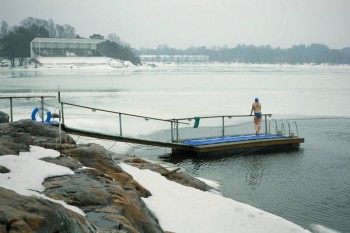
Swimming in the rain: winter joys of Helsinki. Photograph: Valtteri Hirvonen – Eriksson & Co.
After Turin (Italy, 2008) and Seoul (Republic of Korea, 2010), 2012 Helsinki is the third World Design Capital, selected in 2009 by the International Council of Societies of Industrial Design (ICSID).
Helsinki was considered to be a city where ‘design has for decades been a pivotal enabler to building an open city’.
The theme is ‘Open Helsinki – Embedding Design in Life‘. The idea is to improve the everyday life and environment of the citizens and the development of both public services and private enterprises.
In addition to Helsinki, the realisation of the Design Capital year will be carried out by four other cities: neighbouring Espoo, Vantaa and Kauniainen as well as Lahti (some hundred kilometres north of the capital). The Finnish government, two ministries, 21 commercial companies and some universities will co-operate in this project, which has a budget of 16 million euros (2010–2013).
The programme includes some 300 different events, half of them development projects, themed ‘The changing city’ or ‘New solutions’; the other half consists of various exhibitions and encounters for the citizens of Helsinki, tourists and design people.
The ultimate goal of this all is said to be ‘permanent change’. Whatever that really means – good luck!
However, as writer and design critic Kaj Kalin noted in a review in Helsingin Sanomat newspaper (30 December), Finland is full of well-educated designers, but lacks both investment money prepared to take risks and working industry: soon all production will have moved to cheaper countries – and nobody will be able to produce anything. New Finnish design, Kalin argues, mostly approximates merely to ‘a show parade of models and prototypes’.
Finlandia Junior Prize 2012
5 December 2012 | In the news
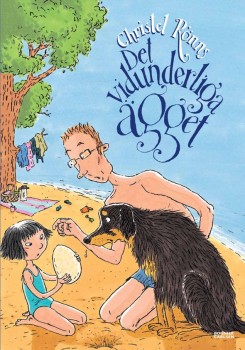 The Finlandia Junior Prize 2012 went to the illustrator and writer Christel Rönns for her book Det vidunderliga ägget (‘The extraordinary egg’, Söderströms & BonnierCarlsen).
The Finlandia Junior Prize 2012 went to the illustrator and writer Christel Rönns for her book Det vidunderliga ägget (‘The extraordinary egg’, Söderströms & BonnierCarlsen).
The winner was chosen from the shortlist of six by the film director and actor Mari Rantasila. Awarding the prize, worth €30,000, on 29 November she said:
‘The book has masterly, original and clear illustrations that support the story; the drawings include amusing details. It is refreshing to read a story about a family that all pulls in the same direction.
‘Det vidunderliga ägget deals with important matters, in a way that is suitable for small children: toleration of difference and the difficulty of loss, underlining that difference is not frightening or negative.’
The following five books also made it to the shortlist: Nörtti: new game (‘The nerd: new game’, Otava), about a schoolboy, bullying and social media by Aleksi Delikouras, Tatu ja Patu pihalla (‘Tatu and Patu on the yard’, Otava), a new picture book in the series about two curious little boys by Aino Havukainen and Sami Toivonen, Hurraa Helsinki! (‘Hurrah Helsinki!’, Tammi), a picture book about Helsinki by Karo Hämäläinen and Salla Savolainen, Puhelias Elias (‘Talkative Elias’, Tammi), an illustrated story about a little boy and his parent’s separation by Essi Kummu and Marika Maijala, and Kirkkaalla liekillä (‘With a bright flame’, Robustos), about 15-year-old Maaria, who lives through difficult times, by Venla Saalo.
Helsinki Book Fair 2012
25 October 2012 | In the news
 The twelfth Helsinki Book Fair opens today at the Exhibition and Convention Centre. Last year the Fair attracted more than 80,000 visitors.
The twelfth Helsinki Book Fair opens today at the Exhibition and Convention Centre. Last year the Fair attracted more than 80,000 visitors.
During four days around 700 interviews and discussions with writers will take place on twelve stages, and there will be more than 300 exhibitors in the various fields of literature.
Author Jari Tervo has been nominated the Book Fair Club’s columnist: in his first contribution, entitled ‘Median myllyt’ (‘The mills of the media’) Tervo says, among other things:
‘During the last 30 years the amount of public attention directed at Finnish authors has probably multiplied by ten. How has it affected the sales of literature? Not at all. The sales haven’t multiplied by ten, or even doubled. Has the increased public attention affected the content of literature? I don’t think it has….
‘The media doesn’t churn authors in its mill because literature is so exceedingly important. To the media the authors are a biomass that is able to articulate a touch more juicily than the average celebrity. An author needs less editing. It’s as simple as that.’
This time the featured country is Hungary: the guest writers are György Spiró, Sandor Zsigmond Papp, Vilmos Csaplár, Péter Esterházy and Léda Forgó. There are 30 guests from 11 countries.
The prize Rakkaudesta kirjaan, ‘Out of love for the book’, was awarded posthumously to the writer, critic and editor Jarmo Papinniemi (1968–2012), who, according to the jury of literary experts was an exceptionally versatile professional working in the field of the arts.
On the make
31 December 2007 | Fiction, Prose
Extracts from the novel Benjamin Kivi (WSOY, 2007). Introduction by Lauri Sihvonen
Benjamin Kivi alias Into Penger, the 1930s
What was Kuihkä worth? What were this little man and his sons worth? What was I worth?
I drove where the little man told me to, with no lights, through a densely populated area. I could only see half a meter in front of me, trying to sense the bends and curves in the road and still keep Tallus’ car in good shape. When we got to the woods I turned on the lights and glanced at the little man sitting next to me. He was stuffing a handkerchief into his sleeve like an old housewife. The top of his head was sweating. He brushed his hair back and shoved his cap down on his head.
I had two hours to think as I drove, but it felt like a few minutes. If I didn’t drive the car, someone else would have, everything would happen just like the little man had planned, and I wouldn’t know anything about Kuihkä. What was I going to do, watch while he was thrown to the wolves? Kuihkä rescued me once. Was it meant to be that I should drive the car? Was I meant to change the course of events? How many coincidences can there be in one lifetime, and what do they signify? If events weren’t random, then what the hell was I supposed to do? More…


